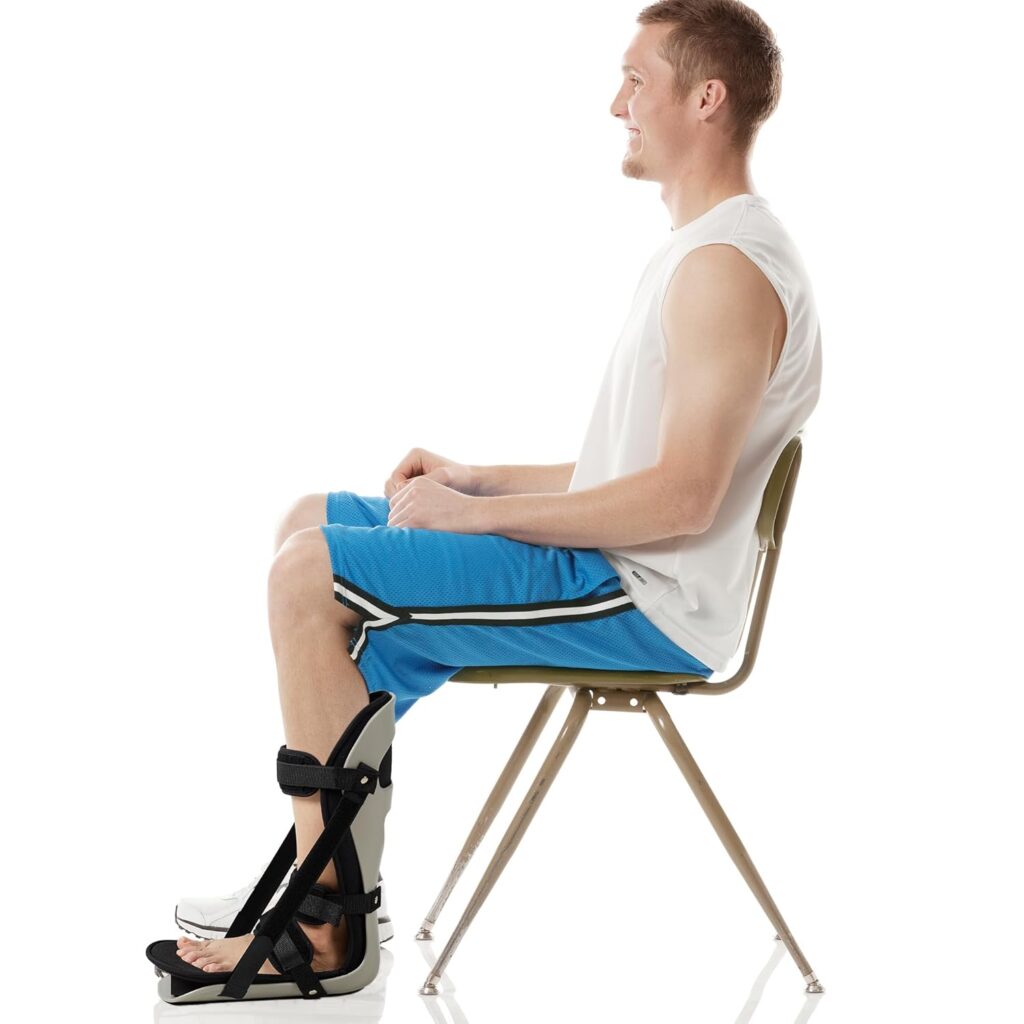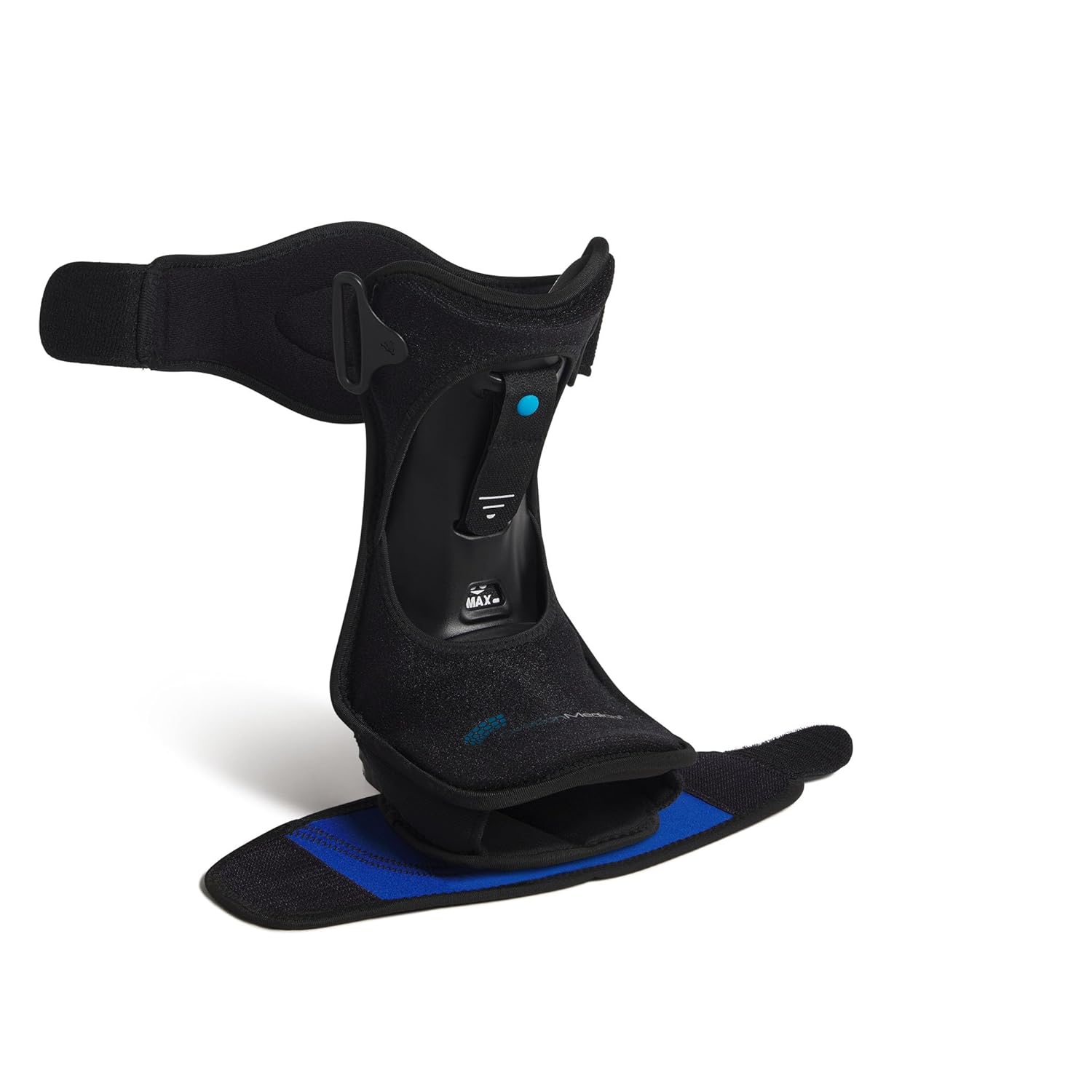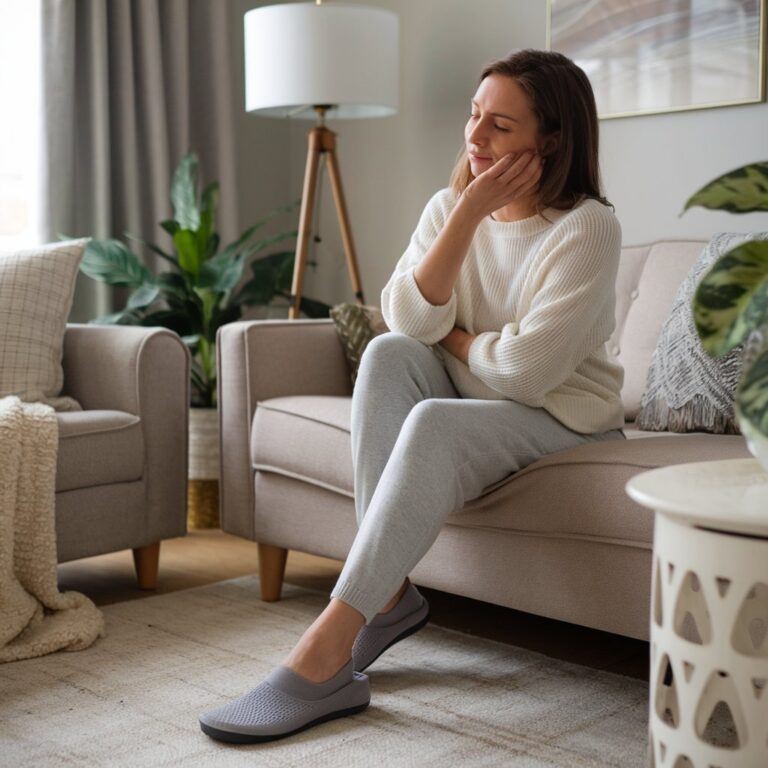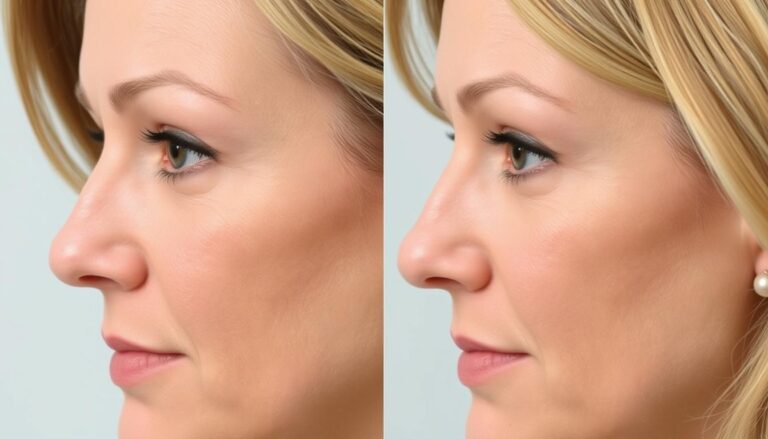Relieve Pain with a Plantar Fasciitis Sleeping Boot

Imagine waking up feeling ready for the day, but then feeling a sharp pain in your heel. This is the reality for many with plantar fasciitis, a condition that affects about one in ten people. The pain is often worst after sleeping or resting for a long time. It’s like sleep doesn’t bring the relief you expect, making every step painful.
But there is hope! The plantar fasciitis sleeping boot has changed how people deal with this issue. These boots are made to ease pain at night and make mornings easier. They stretch your calf muscles and plantar fascia while you sleep. This helps reduce pain and makes your feet more comfortable during the day.
Studies and user stories show that using a plantar fasciitis sleeping boot at night can really help. Let’s look into why this boot is a game-changer for comfort and support while you sleep.
Table of Contents
Understanding Plantar Fasciitis
Plantar fasciitis is a common foot issue that causes a lot of heel pain. It affects millions in the U.S. every year. People with this condition often feel sharp pains, especially when they get up after sitting or lying down. This pain gets worse after sitting or sleeping for a long time.
The plantar fascia is a key tissue in the foot that connects the heel to the toes. If it gets too stressed, it can become inflamed and cause a lot of pain. This condition is often found in athletes and people who do a lot of high-impact activities. But it can also happen to anyone who gains or loses weight or stands for a long time.
Knowing about plantar fasciitis is the first step to getting better. Spotting the early signs can help you get help early, which can make life better. Looking at how you move and your daily habits can help find out why the plantar fascia gets tense. This can lead to better ways to deal with the pain.
| Aspect | Details |
|---|---|
| Common Symptoms | Stabbing heel pain, especially in the morning or after inactivity |
| Common Causes | Overuse, obesity, improper footwear, and physical exertion |
| Frequency of Occurrence | Affects around 2 million people annually in the U.S. |
| Recommended Treatments | Night splints, physical therapy, stretching, orthotic inserts |
| Success Rate with Night Splints | Up to 80% report reduced morning heel pain |
What Causes Plantar Fasciitis Pain?

Plantar fasciitis pain comes from stress on the feet. Foot overuse is a big factor, causing strain on the plantar fascia and leading to inflammation. This inflammation makes the pain worse for those with this condition.
Wearing the wrong shoes can make it worse. Shoes without good arch support or cushioning increase foot overuse. This can happen during everyday activities.
Being overweight puts more pressure on the plantar fascia, raising the risk of pain and inflammation. High-impact sports can also cause plantar fasciitis. Plus, having flat feet or high arches can make it worse. Tight calf muscles limit foot movement, putting more strain on the fascia.
Plantar fasciitis affects about one in ten people at some point. It hits active adults, especially those between 40 and 60, and women more than men. Knowing the causes can help people take steps to reduce pain.
Symptoms of Plantar Fasciitis
Knowing the plantar fasciitis symptoms is key for early treatment. People often feel sharp heel pain when they first step out of bed or after sitting for a long time. This pain is usually worst in the morning, making it known as morning foot pain.
Other plantar fasciitis symptoms include:
- Stiffness and swelling at the heel
- Nagging discomfort after physical activities
- Pain while standing for long periods
A night splint helps by keeping the foot slightly bent. It has helped over 90% of people feel better within 10 months. This shows how important it is to catch these symptoms early.
If you have ongoing morning foot pain, seeing a doctor is a good idea. They can create a plan just for you. Remember, how you sleep can affect your health too. Check out how different sleeping positions can help in this resource.
| Symptom | Description |
|---|---|
| Sharp heel pain | Intense discomfort during initial steps after waking or resting |
| Stiffness | Tight sensation in the heel, especially in the morning |
| Nagging pain | Discomfort experienced post-exercise |
| Pain upon standing | Increased discomfort when standing for extended periods |
How a Plantar Fasciitis Sleeping Boot Works
A plantar fasciitis sleeping boot is key in easing pain from this common issue. It keeps the foot stretched while you sleep, stopping the plantar fascia from getting tight. This helps you wake up feeling less sore and stiff.

Mechanism of Action
The boot gently pulls your toes towards your shin. This keeps the plantar fascia stretched out. It helps reduce tension in your foot that builds up at night, making your heel less painful in the morning.
This action also helps fight against the bad effects of staying still while you sleep.
Benefits of Using a Sleeping Boot
People using the sleeping boot see big benefits, such as:
- Pain reduction during the first steps in the morning
- Improved mobility upon waking
- Enhanced blood circulation, aiding in recovery
- Long-term support for the plantar fascia
Using a night splint does more than just help right away. It can keep the plantar fascia stretched all night, helping with ongoing pain. This can lead to better long-term health for those with plantar fasciitis. Sticking to it can really improve your life with this condition.
The Best Plantar Fasciitis Boot for Sleep
Finding the right plantar fasciitis boot can make a big difference in how you feel and recover. Look for features like adjustability, material quality, support, and comfort in a top-rated boot. It should fit different foot sizes and be light enough for all night use.
Features to Consider
Key features make a plantar fasciitis boot work well:
- Adjustability: It should fit well and adjust for swelling.
- Comfort: Soft padding and breathable materials make it comfy for sleep.
- Support: A good boot keeps the foot at a 90-degree angle, easing plantar fascia pain.
- Durability: Durable materials like high-density polyethylene last longer.
- Versatility: Some boots are also good for walking, offering relief during the day.
Top-Rated Brands
Some brands are leaders in plantar fasciitis boots. Here’s a quick look at them:
| Brand | Price Range ($) | Review Count | Key Features |
|---|---|---|---|
| Soft Night Splint | 22.95 (discounted from 32.99) | 295 | Comfortable padding, arch support |
| VacoPod | 9.99 – 34.99 | 150 | Adjustable fit, lightweight design |
| ProCare | 19.99 – 29.99 | 75 | Durability, versatile function |
These brands offer great comfort, support, and relief from pressure. Choosing the right boot can greatly improve your sleep and foot health.
Benefits of a Comfortable Sleeping Boot for Plantar Fasciitis
For those with plantar fasciitis, a comfy sleeping boot is a game-changer. It helps reduce pain by keeping the foot in the right position all night. This keeps the plantar fascia stretched, which lessens inflammation and morning pain.
A comfy sleeping boot also aids in healing. It keeps the foot in the best position, easing daily tension. This leads to better mobility and comfort during the day, making everyday tasks easier.
But the benefits don’t stop at just easing pain. Using a comfortable sleeping boot as part of a treatment plan can improve foot health overall. It helps people get back to enjoying life without foot pain.
To learn more about better sleep and health with insomnia and sleep issues, check out this resource.
Comparing Plantar Fasciitis Night Splints
Choosing the right night splint is key to recovering from plantar fasciitis. It’s important to know the differences between static and dynamic night splints. This knowledge helps you pick the best one for your needs and comfort.
Static vs. Dynamic Night Splints
Static night splints keep your foot in one position all night. They stretch the plantar fascia consistently, helping to reduce pain when you wake up. This steady stretch supports healing for plantar fasciitis.
Dynamic night splints let your foot move a bit at night. Some people find these more comfortable. They allow for gentle movements, making them less restrictive than static splints. Both static vs. dynamic night splints have their benefits. The best one depends on what you prefer and your healing goals.
Using a sleeping boot at night can help with plantar fasciitis recovery and improve foot health. Adding activities like stretching and wearing the right shoes can also help with healing. For more tips on better sleep, check out the benefits of sleeping on your back.
How to Choose the Right Plantar Fasciitis Boot for Night Relief
Choosing the right plantar fasciitis boot can make a big difference in your recovery. Think about fit, material, and adjustability. A good fit means the boot supports your foot well and is comfy for all night.
What the boot is made of is key to your comfort. Choose ones with breathable fabrics to keep your foot cool and supported. Adjustable straps let you make the boot fit your foot perfectly.
It’s important to try out different boots. Each one may offer different relief and comfort. Visit a store that specializes in foot health products to try on various models. This helps you find the boot that eases pain without making you uncomfortable at night.
Talking to a healthcare professional can also help. They can give you advice based on your specific needs. This makes finding the right plantar fasciitis boot easier and more effective.
Other Treatment Options for Plantar Fasciitis
Using a sleeping boot is just one way to treat plantar fasciitis. Daily stretches and exercises can also help a lot. Activities like calf stretches, towel pulls, and foot flexes make your feet more flexible and less tight. Doing these exercises regularly can really help you get better.
Daily Stretches and Exercises
Adding certain exercises to your daily routine is key for plantar fasciitis. Here are some good ones:
- Calf Stretches
- Towel Pulls
- Foot Flexes
- Achilles Tendon Stretch
- Arch Stretching Exercises
These simple routines can really help reduce pain. It’s important to keep doing them every day.
Consulting with a Specialist
If your symptoms don’t get better with home treatments, see a specialist. A podiatrist can check you out and recommend things like custom orthotics, physical therapy, or steroid injections. Getting professional advice means you get a plan that fits your needs. Options like shockwave therapy or surgery might be suggested for serious cases. Trying different treatments can help find the best way to manage your pain.
Living a healthy life, including keeping a healthy weight and wearing good shoes, is also important. Making these changes, along with other treatments, can make everyday life more comfortable.
For more info on how technology affects your sleep, check out related resources.
Real User Experiences with Plantar Fasciitis Sleeping Boots
People using the plantar fasciitis boot have seen a big change in how they manage their pain. Many say these boots have made their mornings much more comfortable. They can now sleep without the pain in their heels bothering them.
Feedback from users shows a few key points:
- Less morning stiffness and pain, making mornings easier.
- Easy to use, thanks to designs that make sleeping with them simple.
- A non-invasive way to treat plantar fasciitis, unlike harsher methods.
- Good arch support from the boot, which helps with foot health.
Many people are thankful for the relief these boots give. The stories from users show that these boots are not just stories. They reflect a wider approval for a gentle treatment option. This feedback points out how important these boots can be in helping with plantar fasciitis and improving life quality.
| User Feedback | Impact on Pain | Ease of Use | Overall Satisfaction |
|---|---|---|---|
| Improvement in morning comfort | High | Very easy to wear | Highly satisfied |
| Nightly relief from pain | Moderate | Intuitive design | Quite satisfied |
| Reduced stiffness | High | Comfortable fit | Exceeding expectations |
These detailed stories highlight how plantar fasciitis sleeping boots help improve daily life. They reduce pain and aid in healing.
Frequently Asked Questions About Plantar Fasciitis Night Braces
Looking into the plantar fasciitis night brace FAQ can help people understand this helpful treatment. Many have common questions about how to use them, their effectiveness, and how comfortable they are.
Here are some frequently asked questions:
- How long should I wear a plantar fasciitis night brace?
Experts suggest wearing it all night while you sleep for the best results. It’s usually worn for 6 to 8 hours.
- Will a night brace help cure my plantar fasciitis?
A night brace is key in easing pain and helping you recover. But, it’s part of a bigger treatment plan. This plan might include stretching, physical therapy, and wearing the right shoes.
- Can I wear socks with my night brace?
Yes, wearing socks can make you more comfortable and warm. Just make sure they’re not too tight, as that could cut off circulation.
- How do I know if the brace fits correctly?
The brace should be snug but not hurt. It should keep your foot slightly bent up without putting pressure on any spots.
- When can I expect to see improvement?
Many people feel better within a few weeks of using it every night. But, getting all the way back to normal might take a few months. This depends on your situation.
Quick Overview of Plantar Fasciitis Night Brace Benefits:
| Benefit | Description |
|---|---|
| Reduces Heel Pain | Keeps the foot in a good position, easing strain on the plantar fascia. |
| Promotes Healing | Helps with flexibility and reduces tension, which aids in recovery. |
| Improves Mobility | Makes your foot less stiff in the morning, making it easier to move around during the day. |
| Eases Discomfort | Gives support at night, reducing pain. |
Learning about the plantar fasciitis night brace FAQ helps users make smart choices about their treatment. By understanding these common questions, patients can better manage their recovery.
Where to Buy the Best Plantar Fasciitis Sleep Support Boot
Looking to buy a plantar fasciitis boot? You have many options to find the right one for you. Online platforms like Amazon have a wide selection, with reviews to help you choose. Local medical supply stores offer personalized service and let you try boots for comfort and fit.
The Walgreens Plantar Fasciitis Foot Support Overnight is a top pick at $36.99, with over 100 reviews. The Ovation Medical Hybrid Night Splint is another great option, offering good value for $42.63 but if you purchase through below link it will cost only 32.95$. When buying, think about quality, comfort, and the return policy. Many night splints have easy returns to make sure you’re happy.
When buying a plantar fasciitis boot, look for warranties and check the specs. The best treatment comes from a boot that fits well and suits your needs, especially at night.
FAQ
What is a plantar fasciitis sleeping boot?
How long should I wear the boot each night?
Can I wear socks with my plantar fasciitis night splint?
Are there different types of plantar fasciitis night splints?
How do I choose the best plantar fasciitis boot for sleep?
What can I do to enhance the benefits of using a sleeping boot?
How effective are plantar fasciitis sleeping boots?
Where can I purchase the best plantar fasciitis sleep support boot?
Are there any warranties or return policies for plantar fasciitis sleeping boots?






